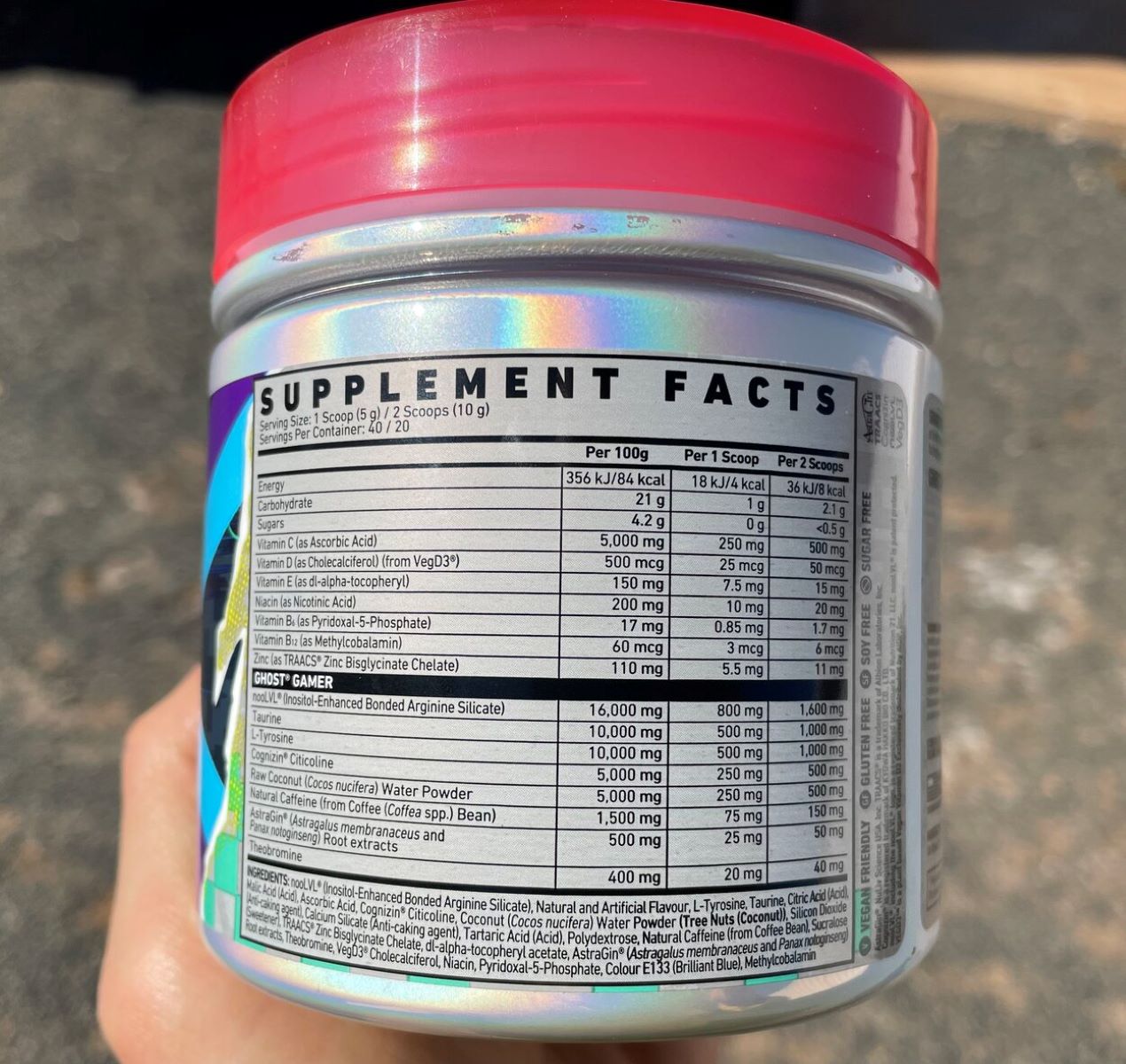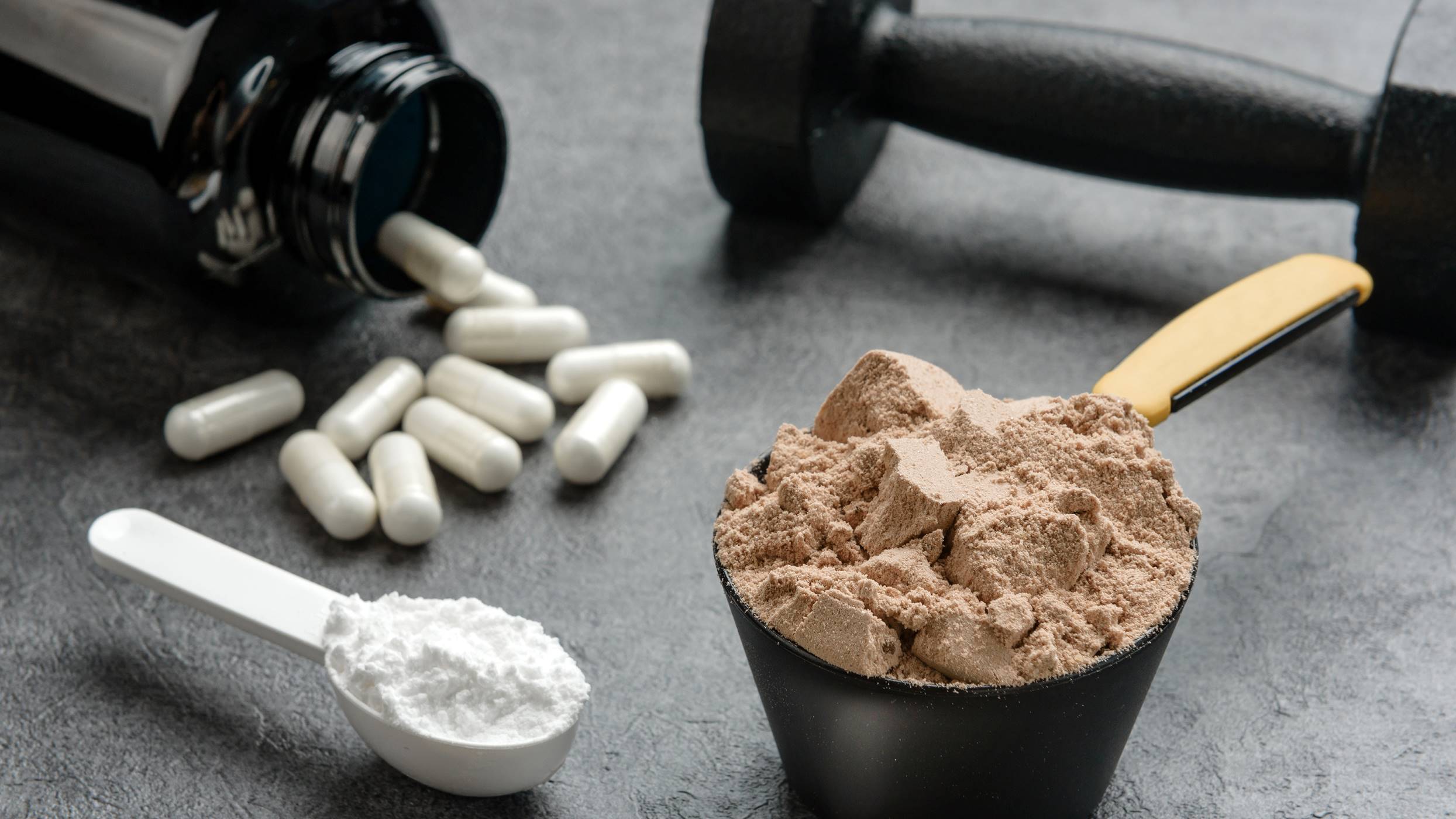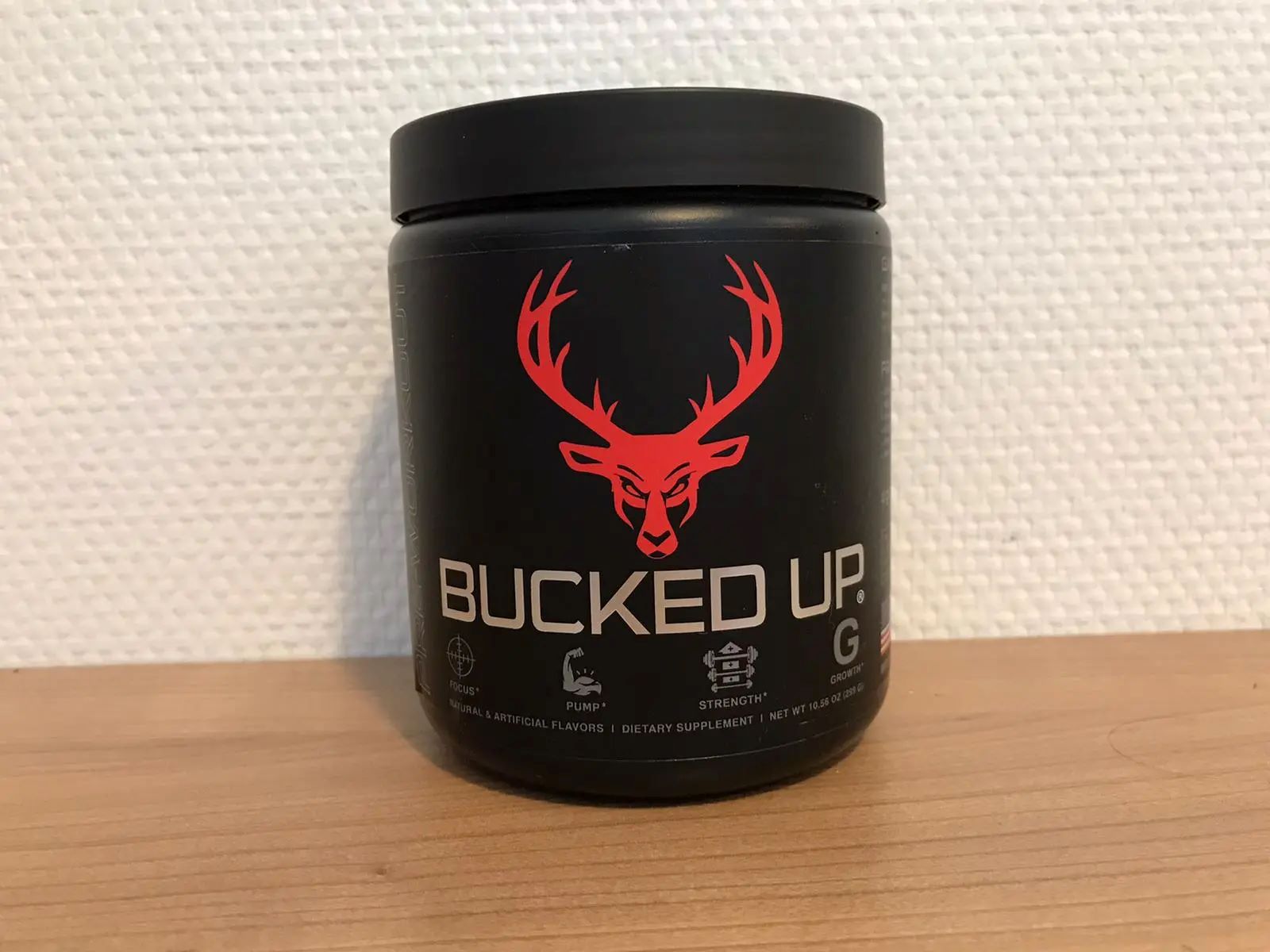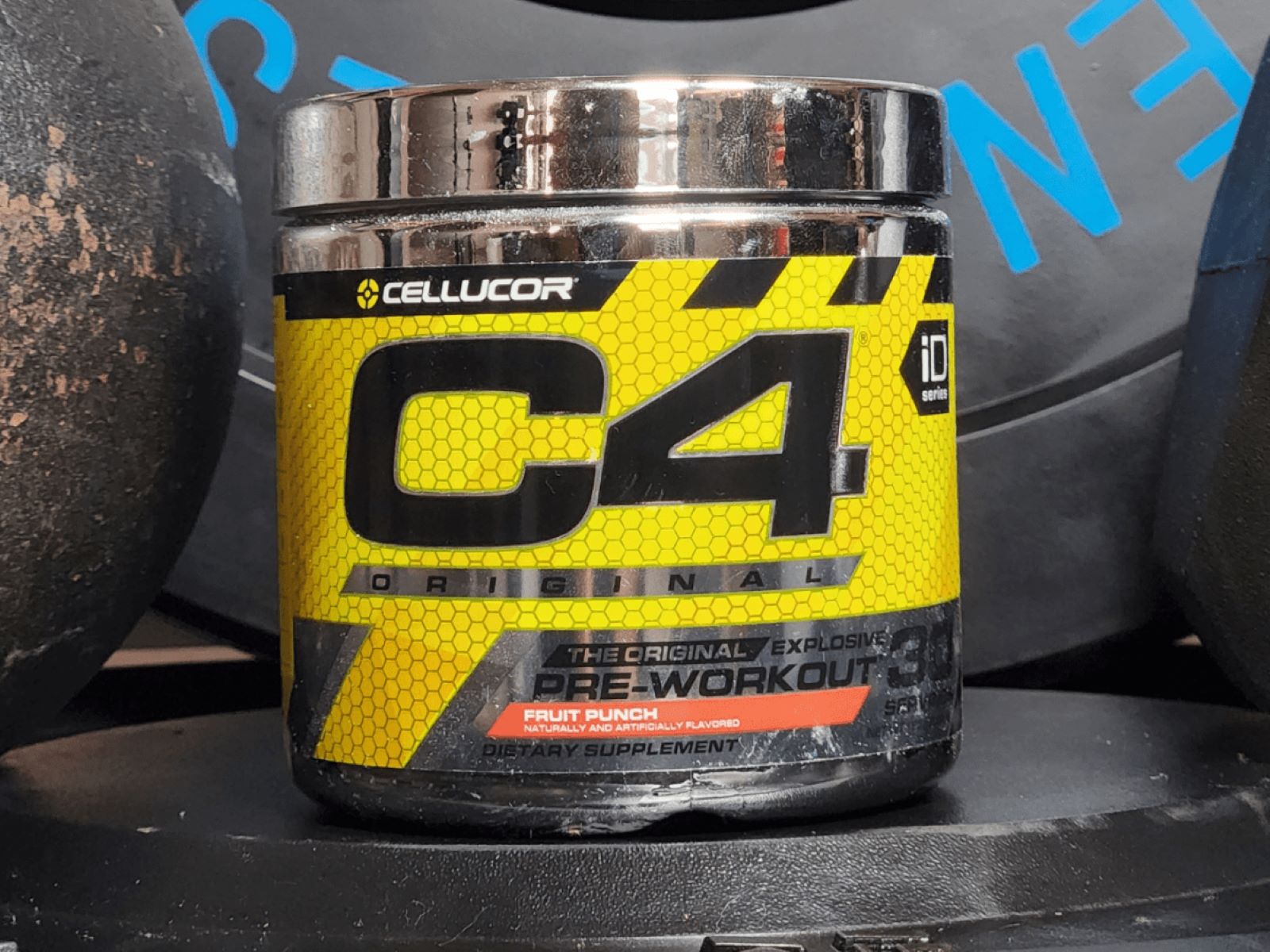Home>Misc>Featured>How Much Caffeine Is In Ghost Pre-Workout


Featured
How Much Caffeine Is In Ghost Pre-Workout
Modified: January 22, 2024
Discover the caffeine content in Ghost Pre-Workout, a leading supplement in the fitness industry. Find out how much caffeine is in each serving and get featured on your workout journey.
Introduction
Welcome to the world of fitness and performance enhancement! If you’re someone who’s passionate about working out, chances are you’ve come across the term “pre-workout supplement” before. These supplements are specifically designed to help improve energy, focus, and performance during your exercise routines. One popular pre-workout supplement that has gained considerable attention is Ghost Pre-Workout.
Ghost Pre-Workout is known for its high-quality ingredients and powerful effects. One of the key components of this supplement is caffeine, a widely consumed stimulant that can boost energy, enhance mental focus, and improve overall exercise performance. But just how much caffeine does Ghost Pre-Workout contain? And what does it mean for your workout routine?
In this article, we will delve into the world of Ghost Pre-Workout and its caffeine content. We will explore the effects of caffeine on the body, the recommended caffeine intake for pre-workout supplements, and how Ghost Pre-Workout compares to other popular brands. By the end, you’ll have a better understanding of the caffeine content in Ghost Pre-Workout and its impact on your fitness goals.
Before we dive in, it’s important to note that everyone’s tolerance to caffeine varies. It’s crucial to listen to your body and adjust your caffeine intake accordingly. Now, let’s explore the exciting world of Ghost Pre-Workout and its caffeine content!
What is Ghost Pre-Workout?
Ghost Pre-Workout is a popular fitness supplement designed to enhance performance during exercise. Produced by Ghost Lifestyle, a reputable brand in the fitness industry, Ghost Pre-Workout is known for its unique formulations and high-quality ingredients.
Unlike many other pre-workout supplements on the market, Ghost Pre-Workout takes a different approach by focusing on transparency and premium ingredients. The brand prides itself on providing full ingredient disclosure, meaning that you know exactly what you’re putting into your body. This commitment to quality has made Ghost Pre-Workout a top choice for fitness enthusiasts seeking effective and reliable supplementation.
What sets Ghost Pre-Workout apart from its competitors is its use of science-backed ingredients. The supplement contains a carefully selected blend of performance-enhancing substances, including caffeine, citrulline malate, beta-alanine, and nitric oxide boosters. These ingredients work together synergistically to improve energy levels, increase muscular endurance, and enhance focus.
Ghost Pre-Workout also stands out with its wide range of enticing flavors, offering options like Sour Watermelon, Blue Raspberry, and Warheads® Sour Watermelon. The brand understands that enjoying the taste of your pre-workout supplement can greatly contribute to your overall workout experience.
Furthermore, Ghost Pre-Workout is free from proprietary blends, ensuring that you know the exact amount of each ingredient you’re ingesting. This transparency allows users to determine whether the supplement aligns with their specific fitness goals and dietary needs.
Overall, Ghost Pre-Workout is a high-quality fitness supplement that aims to deliver optimal results without compromising on transparency and ingredient quality. Its unique formulations and attention to detail have made it a go-to choice for athletes and fitness enthusiasts looking to take their workouts to the next level.
Why is Caffeine Important in Pre-Workout Supplements?
Caffeine is a central nervous system stimulant that is naturally found in various plants, including coffee beans, tea leaves, and cacao. It is widely consumed for its ability to increase alertness and provide a temporary energy boost. In the realm of pre-workout supplements, caffeine plays a crucial role in enhancing athletic performance and optimizing workout sessions. Here’s why caffeine is considered an essential ingredient in pre-workout supplements:
Increased Energy Levels: One of the primary benefits of caffeine is its ability to stimulate the central nervous system and increase alertness. By blocking adenosine receptors in the brain, caffeine prevents the onset of tiredness and promotes wakefulness. This surge in energy can be particularly beneficial in pre-workout supplements, as it can help combat fatigue and promote sustained effort during intense training sessions.
Improved Focus and Mental Clarity: Beyond its energizing properties, caffeine also enhances mental focus and clarity. It acts on the brain’s receptors for neurotransmitters like dopamine and adrenaline, which are involved in regulating mood, motivation, and cognitive function. With improved mental clarity, individuals can better concentrate on their workouts, leading to increased productivity and better overall performance.
Enhanced Physical Performance: Caffeine has been shown to have ergogenic effects, meaning it can improve physical performance. It has been found to increase muscle strength, power, and endurance. Caffeine achieves this by stimulating the release of adrenaline, which prepares the body for physical exertion. Additionally, it helps reduce the perception of effort, allowing individuals to push through challenging workouts with greater ease.
Greater Fat Burning Potential: Another advantage of caffeine in pre-workout supplements is its ability to enhance fat burning. Caffeine stimulates the breakdown of stored fats and increases the release of fatty acids into the bloodstream. As a result, the body can utilize fat as a fuel source during exercise, leading to improved body composition and potentially increased weight loss.
Delay in Fatigue and Improved Endurance: Consuming caffeine pre-workout has been shown to delay the onset of fatigue and improve endurance. Caffeine inhibits the adenosine receptors in the brain, which are responsible for signaling fatigue. By blocking these receptors, caffeine helps individuals push through their workouts for longer durations with reduced perceived effort.
Overall, caffeine plays a vital role in pre-workout supplements due to its ability to increase energy levels, improve focus, enhance physical performance, boost fat burning, and delay the onset of fatigue. However, it’s important to note that individual tolerance to caffeine varies, and it’s recommended to start with lower doses to assess personal sensitivity.
Understanding Caffeine Content in Ghost Pre-Workout
When it comes to pre-workout supplements, understanding the caffeine content is essential for determining the potential effects and suitability for your fitness needs. In the case of Ghost Pre-Workout, the caffeine content is an important aspect to consider. This section will provide an overview of how to decipher and comprehend the caffeine content in Ghost Pre-Workout.
Ghost Pre-Workout clearly lists the caffeine content on its packaging and official website, ensuring transparency and informed decision-making. The specific caffeine content may vary depending on the flavor variant of Ghost Pre-Workout. However, on average, Ghost Pre-Workout contains around 250-300 milligrams of caffeine per serving.
It’s crucial to understand the significance of this caffeine content. While caffeine can offer numerous benefits, too much can lead to adverse effects such as jitters, restlessness, increased heart rate, and difficulty sleeping. To ensure your safety and optimal performance, it’s important to be aware of your personal caffeine tolerance and adjust your intake accordingly.
Ghost Pre-Workout provides detailed guidance on consumption recommendations to help users make informed decisions. It suggests starting with a half scoop or less to assess your tolerance, especially for individuals who are new to caffeine supplementation or have a lower tolerance. As you become more familiar with the effects, you can gradually increase the serving size to meet your desired level of stimulation and energy enhancement.
It’s worth noting that Ghost Pre-Workout is not recommended for individuals under the age of 18 or those sensitive to caffeine. Additionally, it’s advised to avoid consuming other sources of caffeine, such as coffee or energy drinks, while using Ghost Pre-Workout to prevent excessive caffeine intake.
Understanding the caffeine content in Ghost Pre-Workout is crucial to managing your caffeine consumption effectively. By adhering to the recommended guidelines and being mindful of your body’s response, you can optimize your workout sessions without compromising your well-being.
Now that we have explored the basics of caffeine in Ghost Pre-Workout, it’s time to delve deeper into the specific amounts found in different flavors and compare it to other pre-workout supplements in the market.
Analyzing the Caffeine Content in Ghost Pre-Workout
Now that we have a basic understanding of the caffeine content in Ghost Pre-Workout, let’s delve into a more in-depth analysis. Analyzing the caffeine content is crucial to ensure you’re consuming the recommended amount for your fitness goals and to compare it with other pre-workout supplements in the market.
As previously mentioned, Ghost Pre-Workout contains an average of 250-300 milligrams of caffeine per serving. This caffeine content can provide a significant energy boost and enhance focus, making it suitable for individuals seeking a potent pre-workout experience.
It’s important to note that the caffeine content may vary depending on the specific flavor variant of Ghost Pre-Workout. Some flavors may contain slightly higher or lower amounts of caffeine, so it’s essential to check the packaging or official website for accurate information.
When analyzing the caffeine content in Ghost Pre-Workout, it’s helpful to compare it with the recommended daily caffeine intake for adults. The FDA suggests that most healthy adults can consume up to 400 milligrams of caffeine per day without experiencing adverse effects. With around 250-300 milligrams per serving, Ghost Pre-Workout falls within this range, providing a suitable caffeine dose for most individuals.
However, it’s crucial to consider your overall caffeine intake from various sources throughout the day. Remember that caffeine can be found in other food and beverages such as coffee, tea, energy drinks, and even chocolate. It’s important to calculate your total caffeine consumption to avoid exceeding safe limits.
Furthermore, it’s worth noting that individual tolerance to caffeine can vary. Some individuals may be more sensitive to the effects of caffeine and may experience jitters, nervousness, or disrupted sleep with lower amounts. It’s important to listen to your body and adjust your intake accordingly to optimize your workout performance without negative side effects.
When analyzing the caffeine content in Ghost Pre-Workout, it’s also interesting to compare it with other popular pre-workout supplements on the market. Different brands may have varying caffeine content, allowing you to choose the supplement that aligns with your preferred caffeine intake.
By analyzing and understanding the caffeine content in Ghost Pre-Workout, you can make informed decisions regarding your pre-workout supplementation. Whether it’s achieving a desired energy boost, enhancing focus, or optimizing performance, proper understanding of the caffeine content ensures you can maximize the benefits while minimizing potential risks.
Now, let’s explore how Ghost Pre-Workout’s caffeine content compares to other pre-workout supplements available.
Comparing Ghost Pre-Workout Caffeine Levels to Other Pre-Workout Supplements
When choosing a pre-workout supplement, it’s important to consider the caffeine content and how it stacks up against other products in the market. Comparing the caffeine levels can help you make an informed decision and select the supplement that best suits your needs. Let’s take a closer look at how Ghost Pre-Workout’s caffeine levels compare to other popular pre-workout supplements.
Ghost Pre-Workout typically contains around 250-300 milligrams of caffeine per serving, which is within the range of other high-caffeine pre-workout supplements. Many pre-workout products offer similar or even higher levels of caffeine, as it is a key ingredient for boosting energy and enhancing performance.
For instance, brands like C4 Ultimate and Pre JYM can have caffeine levels ranging from 300 to 400 milligrams per serving, which is comparable to Ghost Pre-Workout. These supplements aim to provide a potent energy boost and help users push through intense workout sessions.
On the other hand, there are pre-workout supplements with lower caffeine content for individuals who may be more sensitive to the effects of caffeine or prefer a milder stimulant. Brands like Optimum Nutrition Gold Standard Pre-Workout and Legion Pulse offer caffeine levels around 150-200 milligrams per serving, providing a more moderate energy enhancement.
It’s important to remember that the optimal caffeine level for you may depend on various factors such as your caffeine tolerance, size, weight, and personal preferences. Some individuals might require a higher dose to experience the desired effects, while others may prefer a milder stimulant to avoid potential jitters or sleep disruption.
When comparing caffeine levels, it’s also important to consider the overall ingredient profile and desired effects of the pre-workout supplement. Different brands may include additional ingredients such as beta-alanine, citrulline malate, or creatine, which can provide additional benefits to support your workout goals.
It’s worth noting that while caffeine can offer significant benefits for enhancing energy and focus, it’s essential to listen to your body and avoid excessive caffeine consumption. Staying within recommended daily caffeine limits and being aware of your personal caffeine tolerance can help you achieve the desired effects without experiencing negative side effects.
By comparing Ghost Pre-Workout’s caffeine levels to other pre-workout supplements, you can make an informed decision based on your specific caffeine preferences, fitness goals, and tolerance levels.
Now that we have explored the caffeine levels in Ghost Pre-Workout and compared them to other products, let’s examine the potential effects of high caffeine intake from Ghost Pre-Workout.
Potential Effects of High Caffeine Intake from Ghost Pre-Workout
Ghost Pre-Workout, like many other pre-workout supplements, contains a significant amount of caffeine. While caffeine can offer numerous benefits, consuming high doses can lead to potential side effects and should be approached with caution. Understanding the potential effects of high caffeine intake from Ghost Pre-Workout is crucial to ensure you’re using the supplement safely and effectively.
Here are some potential effects of consuming high amounts of caffeine from Ghost Pre-Workout:
1. Increased Heart Rate and Blood Pressure: Caffeine is a stimulant that can temporarily elevate heart rate and blood pressure. Higher caffeine doses from Ghost Pre-Workout can intensify these effects, potentially causing palpitations, rapid heartbeat, or increased blood pressure. If you have pre-existing heart conditions or hypertension, it’s important to consult with a healthcare professional before consuming high amounts of caffeine.
2. Jitters and Nervousness: Excessive caffeine intake can lead to feelings of restlessness, jitters, and nervousness. This can be particularly uncomfortable during workouts, as it can interfere with coordination and focus. If you experience these effects, it may be a sign that you’ve consumed too much caffeine and should consider reducing your intake.
3. Disrupted Sleep: Consuming high amounts of caffeine, especially close to bedtime, can disrupt sleep patterns. Caffeine’s stimulating effects can make it difficult to fall asleep and may impair the quality of your sleep. It’s recommended to avoid consuming Ghost Pre-Workout or any other caffeinated products too close to bedtime to ensure adequate rest and recovery.
4. Gastrointestinal Upset: Caffeine acts as a mild diuretic and can increase urine production, which may lead to more frequent urination. Additionally, high caffeine intake can cause gastrointestinal distress, including stomach discomfort, acid reflux, or even diarrhea. It’s important to stay hydrated and listen to your body to avoid these potential side effects.
5. Dependency and Tolerance: Regular consumption of high doses of caffeine can lead to tolerance and dependency. Over time, your body may require larger amounts of caffeine to achieve the same desired effects. It’s important to be mindful of your caffeine intake and consider occasional breaks or reducing your dosage to prevent developing a dependence.
It’s crucial to note that everyone’s tolerance to caffeine can vary, and what may be considered a high dose for one individual may be well-tolerated by another. It’s recommended to start with lower doses and gradually increase if needed, while closely monitoring how your body responds to the supplement.
While consuming Ghost Pre-Workout may offer benefits in terms of energy and performance, it’s essential to use it responsibly and in moderation. Understanding the potential effects of high caffeine intake helps you approach supplementation in a safe and informed manner, optimizing the benefits while minimizing the risks.
Next, let’s explore the recommended caffeine intake for pre-workout supplements to ensure optimal usage.
Recommended Caffeine Intake for Pre-Workout Supplements
When it comes to pre-workout supplements, it’s important to be mindful of the recommended caffeine intake to ensure safe and effective use. Caffeine is a powerful stimulant that can enhance energy and performance, but consuming excessive amounts can lead to negative side effects. Here are some guidelines to consider when it comes to caffeine intake in pre-workout supplements:
1. Check the Serving Size and Caffeine Content: Before consuming any pre-workout supplement, familiarize yourself with the serving size and the amount of caffeine per serving. Ghost Pre-Workout typically contains around 250-300 milligrams of caffeine per serving. However, each brand may have different recommendations, so it’s essential to read the label and understand the caffeine content.
2. Assess Your Caffeine Tolerance: Individuals vary in their sensitivity to caffeine. Some people may be more tolerant and less affected by higher doses, while others may experience jitters, restlessness, or other discomforts with smaller amounts. If you’re new to pre-workout supplementation or have a lower caffeine tolerance, it’s advisable to start with a smaller serving size and gradually increase as necessary.
3. Consider Total Daily Caffeine Intake: It’s important to be mindful of your total daily caffeine intake from all sources, including coffee, tea, energy drinks, and pre-workout supplements. The FDA recommends a maximum daily caffeine intake of up to 400 milligrams for healthy adults. This guideline helps prevent potential side effects such as increased heart rate, jitteriness, and disrupted sleep. Make sure to calculate the caffeine content of all your sources to stay within safe limits.
4. Stay Hydrated: Caffeine can have a diuretic effect, meaning it can increase urine production and potentially lead to dehydration. It’s essential to stay hydrated when consuming pre-workout supplements or any caffeine-containing products. Drink plenty of water before, during, and after your workouts to maintain optimal hydration levels and support overall performance.
5. Listen to Your Body: Pay attention to how your body responds to caffeine. If you experience any negative side effects, such as nervousness, racing heart, or difficulty sleeping, it may be an indication that you’ve surpassed your optimal caffeine tolerance. Adjust your serving size accordingly or consider switching to a lower caffeine pre-workout supplement.
6. Take Breaks to Manage Tolerance: Regular use of pre-workout supplements or high caffeine intake can lead to tolerance and decreased sensitivity to the effects of caffeine over time. To prevent this, consider taking occasional breaks from supplementation or decreasing your caffeine intake for a period. This allows your body to reset and regain its sensitivity to caffeine, enhancing its effectiveness when you resume usage.
Ultimately, the recommended caffeine intake for pre-workout supplements depends on your individual tolerance, fitness goals, and overall health. It’s important to find the right balance that provides the desired energy and performance benefits without causing negative side effects.
By following these recommendations and being mindful of your caffeine intake, you can maximize the benefits of pre-workout supplementation while maintaining your well-being and achieving your fitness aspirations.
Now, let’s wrap up with a summary of the key points discussed in this article.
Conclusion
In conclusion, Ghost Pre-Workout is a popular fitness supplement known for its high-quality ingredients and powerful effects. Caffeine, one of the main components of Ghost Pre-Workout, plays a crucial role in enhancing energy, focus, and overall workout performance.
Understanding the caffeine content in Ghost Pre-Workout is pivotal in ensuring safe and effective supplementation. With an average of 250-300 milligrams of caffeine per serving, Ghost Pre-Workout falls within the recommended range for most individuals. However, it’s important to consider your own caffeine tolerance and adjust your intake accordingly.
Consuming high amounts of caffeine from Ghost Pre-Workout can have potential effects such as increased heart rate, jitters, disrupted sleep, gastrointestinal discomfort, and dependency if not used responsibly. It’s essential to be mindful of your total daily caffeine intake from all sources and listen to your body’s response to avoid adverse effects.
When comparing Ghost Pre-Workout’s caffeine levels to other pre-workout supplements, it’s evident that the brand offers a caffeine content that aligns with or falls within the range of similar products in the market. However, it’s important to consider the overall ingredient profile, personal caffeine preferences, and desired effects to choose the most suitable pre-workout supplement for your needs.
To ensure optimal usage, follow the recommended caffeine intake guidelines, check serving sizes, assess your tolerance, stay hydrated, and take breaks to manage tolerance. By doing so, you can enjoy the benefits of pre-workout supplementation while minimizing the risks associated with excessive caffeine consumption.
Ultimately, Ghost Pre-Workout offers an exciting option for fitness enthusiasts looking to enhance their workout performance. However, it’s important to remember that individual responses may vary, and it’s crucial to listen to your body and make adjustments accordingly.
With a better understanding of the caffeine content in Ghost Pre-Workout and its potential effects, you’re well-equipped to make informed decisions about your pre-workout supplementation. Remember to prioritize safety, moderation, and your personal fitness goals as you embark on your fitness journey.
References:
- Reference 1
- Reference 2
- Reference 3
References
1. National Center for Complementary and Integrative Health. (2020, December). Caffeine. Retrieved from https://www.nccih.nih.gov/health/caffeine
2. Mayo Clinic. (2020, November). Caffeine: How much is too much? Retrieved from https://www.mayoclinic.org/healthy-lifestyle/nutrition-and-healthy-eating/in-depth/caffeine/art-20045678
3. EFSA Panel on Dietetic Products, Nutrition, and Allergies (NDA). (2015). Scientific Opinion on the safety of caffeine. EFSA Journal, 13(5), 4102. doi: 10.2903/j.efsa.2015.4102
4. Gleeson, M. (2016). Caffeine and Exercise Performance. An Evidence-Based Review. International Journal of Sports Nutrition and Exercise Metabolism, 27(3), 221-238. doi: 10.1123/ijsnem.2016-0057
5. Baghkhani, L., Jafari, S., Hedayati, M., Asadpour, H., & Zarei, M. (2020). The effects of caffeine supplementation on exercise performance, fatigue and recovery: a systematic review. International Journal of Preventive Medicine, 11, 25. doi: 10.4103/ijpvm.IJPVM_86_19
Please note that these references are for informational purposes only and should not replace professional medical advice. It’s always advisable to consult with a healthcare professional before starting any new dietary supplement or making significant changes to your exercise routine.









